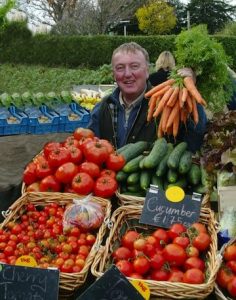The Food Safety Authority of Ireland (FSAI) has published new guidance to assist growers with the safe production of fresh produce on farms.
 The guidance and its accompanying simplified leaflet outlines the potential risks associated with fresh produce and provides practical advice to growers to reduce this risk and improve food safety. They were developed in conjunction with an expert working group comprising growers, processors, retailers, State bodies and former representatives. Fresh produce (which includes fresh fruits, vegetables, mushrooms, sprouted seeds, edible flowers and herbs) is an integral component of the Irish diet and its popularity and consumption continues to increase. As such, it is important that growers producing fresh produce in Ireland use good agricultural and hygiene practices to reduce risk and improve the safety of fresh produce for all consumers.
The guidance and its accompanying simplified leaflet outlines the potential risks associated with fresh produce and provides practical advice to growers to reduce this risk and improve food safety. They were developed in conjunction with an expert working group comprising growers, processors, retailers, State bodies and former representatives. Fresh produce (which includes fresh fruits, vegetables, mushrooms, sprouted seeds, edible flowers and herbs) is an integral component of the Irish diet and its popularity and consumption continues to increase. As such, it is important that growers producing fresh produce in Ireland use good agricultural and hygiene practices to reduce risk and improve the safety of fresh produce for all consumers.
The new guidance comes at a time when outbreaks of foodborne illness associated with fresh produce are increasing. The European Food Safety Authority (EFSA) has identified that fresh produce such as leafy greens; bulb and stem vegetables; tomatoes; melons; fresh pods, legumes or grains; sprouted seeds and berries pose the highest risks to consumers. In 2013, frozen berries caused 240 confirmed cases of hepatitis, with a probable 1,075 further cases across 11 European countries, including Ireland. The FSAI’s advice to boil all frozen imported berries before consumption is still in place, as contaminated berries could still be circulating in the food chain.
According to Dr Pamela Byrne, Chief Executive, FSAI anything which comes into contact with fresh produce has the potential to cause contamination and it is vital that growers take the necessary steps to limit contamination of fresh produce in the first instance.
“A lot of fresh produce is eaten raw such as fruits, vegetables and herbs, so any harmful bugs that may be in the produce will not be removed by cooking. This places a big onus on growers to use good agricultural and hygiene practices to reduce the risk of contamination of fresh produce,” said Dr Byrne.
The guidance makes it clear that anyone producing fresh produce for sale must be registered as a grower with the Department of Agriculture, Food and the Marine. The guidance goes on to highlight eight key areas which growers should address to help reduce risk and improve food safety, including:
- Choose the right site to grow fresh produce
- Restrict the access of animals, pests and people to that site
- Use organic fertilisers safely
- Use pesticides safely
- Source and use a safe water supply
- Use good harvesting practices
- Train staff and provide good staff facilities
- Put a system of traceability and recall in place
The FSAI acknowledges and thanks the working group* who assisted in developing the guidance document. It was comprised of growers, processors, retailers as well as representatives of the Department of Agriculture, Food and the Marine, Bord Bia, Teagasc, the EPA and the Irish Farmers Association. The new guidance document and leaflet are available for free download at www.fsai.ie.
